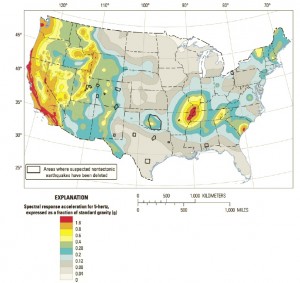Sarah Boon, Environment & Earth Sciences co-editor
Fossil fuels are of huge benefit to society – many would argue that life as we know it could grind to a halt in their absence. However, the environmental, public health, and economic costs of fossil fuel exploration and development can be quite significant, prompting the question of whether the benefits still outweigh these costs.
Last Tuesday, a magnitude 4.8 earthquake rattled the small community of Fox Creek, Alberta, approximately 250 km northwest of Edmonton. The area has experienced quakes in the M2.0-3.0 range for the past six months, and researchers suggest it’s related to hydraulic fracking. The Alberta Energy Regulator has shut down the nearest fracking operation until they can analyze the quake and determine ways to mitigate it.
News of an earthquake in oil and gas territory is not surprising. In British Columbia, there were 231 fracking-related earthquakes between August 2013 and October 2014; the biggest two registered at M4.4 (2014) and M4.6 (2015). The state of Oklahoma has been in the news for years due to its wastewater injection-related earthquakes: 585 in 2014 and 842 in 2015. It’s to the point where science journalists no longer report on new Oklahoma quakes because they occur so frequently:
That moment when you decide not to cover a M4.8 in freaking OKLAHOMA because they have so many earthquakes & had a M5 last year? Not good.
– Mika McKinnon (@mikamckinnon) January 7, 2016
The impacts of fossil fuel development usually only come to light either when they occur locally or when they’re big enough to make the national news. For example, there’s Canadian Natural Resources’ (CNRL) endless oil spill in Cold Lake, Alberta, where oil has been oozing from ground fractures for over two years and shows no signs of stopping. There’s the 2013 Lac Mégantic explosion, caused by the derailment of a number of tankers transporting crude oil, that killed 47 people and demolished a large part of the town.
There’s also the current California gas leak, which started in October of 2015 and likely won’t be fixed until March of this year. Thousands of families have been relocated and two schools have been closed due to the public health effects of the leak. And of course there’s the 2010 Deepwater Horizon oil spill in the Gulf of Mexico, the impacts of which continue to be felt today.
While these incidents give us specific examples of the impacts of fossil fuel development, it’s when event data are collated across larger areas that the costs really stand out.
In 2015, High Country News pulled together a map of oil spill incidents across the US since 2010. In Canada, the National Energy Board made a similar map of incidents across the country since 2008. A study by NOAA researchers identified locations worldwide where methane gas leaks are being burned off (using 2012 data), while the USGS released a map showing the location and frequency of US fracking-related (i.e., ‘induced’) earthquakes since 2009.
These datasets do an excellent job of showing the extent and frequency fossil fuel development impacts, and make it clear that there’s much more going on than just those incidents that appear in local news media.
For example, the USGS map shows the risk of an earthquake in the shaded colours, while the polygons indicate areas where induced earthquakes have occurred. The distribution of polygons indicates that these earthquakes are now affecting states across the country.
(Image from USGS report; public domain)
The map of global gas leaks shows that – while flaring in 2012 occurred across North America – it’s a global problem, with high volumes of gas being flared across many continents.
Spatial distribution of natural gas flaring in 2012 (from Elvidge et al. 2015; CC-BY-4.0)
One thing these collated datasets don’t take into account is the climate change impacts of both fossil fuel extraction and use. A 2015 study found that, to keep global temperatures from increasing by more than 2°C, existing fossil fuel reserves must be kept in the ground. Thus, in addition to oil spills, earthquakes, and gas leaks, there are also climate change effects.
Considering the range of environmental, public health, and economic impacts, is the extraction and use of fossil fuels still worth it?
It’s a tough question to answer, largely because we don’t currently have good alternatives to fossil fuels that provide the same amount of energy, efficiently, but with less impact. Recent studies suggest it will be some time before renewables are able to generate a significant proportion of the energy that would otherwise come from fossil fuels. For the time being, the global economy is tied to fossil fuels to keep society functioning.
But it’s a question that can’t be ignored, as – at some point – the costs may outweigh the benefits.






3 thoughts on “Are fossil fuels really worth it?”
Comments are closed.